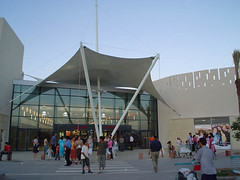Flamboyant Japanese internet tycoon turned politician Takafumi Horie has said he will bring Arab news broadcaster Aljazeera to Japan, hoping to provide a greater variety of views to the public.
The 32-year-old entrepreneur on Monday said his firm, Livedoor, which offers a portal site much like Yahoo! along with other internet services, has signed a deal with Qatar-based Aljazeera to distribute its news online in Japanese.
Horie, an unsuccessful candidate in last month’s parliamentary election, wrote on his blog that he was trying to diversify Livedoor’s news content.
I think it’s good that Al-Jazeera’s news will be reaching more people in the world, giving them another view of the events that take place in the Arab world.
I’m especially looking forward to their English news channel that should be launched soon.


 Today, when I got home, I found this big letter stuffed in our mailbox. It was torn on the edges as if someone tried to peek in.
Today, when I got home, I found this big letter stuffed in our mailbox. It was torn on the edges as if someone tried to peek in.